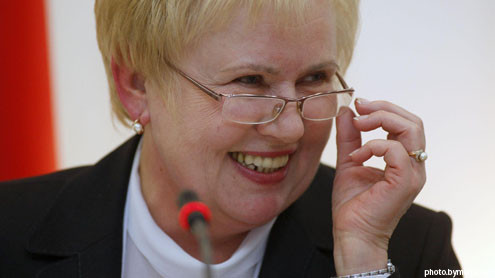
Belarus: Domestic Events and Outside Actors
Publication: Eurasia Daily Monitor Volume: 12 Issue: 143
By:

Recent news about Belarus has recently concentrated on three somewhat connected issues: the upcoming presidential elections, economic decline, and the activities of Moscow and the collective West vis-à-vis Minsk.
On July 20, Lidia Ermoshina, chairperson of Belarus’s Central Electoral Commission (CEC), participated in a Vienna-based seminar of the Organization for Security and Cooperation in Europe (OSCE). Ermoshina is under travel sanctions, but these do not apply if and when an international institution of which Belarus is a member issues a formal invitation (Tut.by, July 19). Uladzimer Neklyaev, a poet and a 2010 presidential candidate, expressed his triple outrage at a) Europeans allowing Ermoshina to visit Vienna, b) the CEC’s rejection of the still jailed Mikalay Statkevich’s presidential candidacy, and c) Europeans sacrificing their principles and improving relations with President Alyaksandr Lukashenka’s regime. In Neklyaev’s view, however, not just Europe is at fault but also the Belarusian opposition itself, as it failed to promote a single candidate for the upcoming presidential election. If the domestic opposition groups had succeeded in unifying behind a single presidential aspirant, then “Ermoshina would not have been in Europe,” Neklyaev believes (Svaboda.org, July 21). In fact, European visits of Belarusians under travel sanctions are not a new phenomenon. Even Anatoly Kuleshov, the former minster of internal affairs of Belarus, who bore immediate responsibility for the government’s post-election crackdown on December 19, 2010, visited Interpol headquarters in Lyon, France, in January 2012.
The Belarusian Institute for Strategic Studies, a Minsk-based think tank funded by the West, predicts that the authorities will intensify repressive actions against opposition-minded individuals during the run-up to the elections. But much will depend on possible protests, which do not promise to be large-scale this time (Tut.by , July 22).
In the meantime, the campaign staffs of the registered presidential hopefuls have begun to collect the signatures required for their candidates to run. Nasha Niva, a Belarusian-language newspaper, reports that people express more willingness to sign up for Lukashenka than for other candidates, and they even line up to add their signature in support of the incumbent president (Nasha Niva, July 23). It is unlikely one can come up with a more convincing justification of Lukashenka’s popularity than that furnished by Nasha Niva’s reporting, arguably the utmost anti-Lukashenka media outlet officially existing in Belarus.
In turn, Anatol Lyabedzka, the chairman of the United Civic Party and—after falling out with the Belarusian president in 1995—also a staunchly anti-Lukashenka politician, campaigned at the entrance to the Minsk Tractor Factory. He used a loudspeaker and handed out leaflets with his program titled “A million new places of work.” However, it seems relatively few workers paid attention (Tut.by, July 22). In contrast, while not actually campaigning, President Lukashenka spent a day with the popular French movie actor Gerard Depardieu, who in January 2013 was granted Russian citizenship by Vladimir Putin. In Ostroshitsky Gorodok, 15 kilometers northeast of Minsk, Lukashenka showed Depardieu a Belarusian farm and taught him how to mow grass with a scythe (Euronews, July 22). Over the past week, the online video of this meeting, posted by Euronews, received the most views of any on the site.
Meanwhile, after shrinking for six months, the Belarusian economy, formally speaking, has now entered a full-blown recession. Exact predictions of the gross domestic product’s contraction throughout the entire year of 2015 vary—from 3 percent, according to the World Bank, to 1–2 percent according to the Eurasian Development Bank. But now the very fact of recession is no longer in doubt (Naviny.by, July 22).
In this regard, the attitudes of the region’s major external actors gain even greater significance. Officially, Russia has already decided to grant Belarus a $760 million loan and is considering Minsk’s request to borrow $3 billion (Vzglyad, July 22). However, there is a heated debate in the Russian media regarding the expediency of further aiding Belarus. As usual, Andrei Souzdaltsev—the vice dean of Russia’s Higher School of Economics, who in 2006 was evicted from Belarus—expressed the opinion least favorable to Minsk. According to Souzdaltsev, Lukashenka has ultimately lost whatever trust he still enjoyed from Moscow because the Belarusian president allows the smuggling of banned Western food into Russia, resists establishing a Russian airbase in Bobruisk, has never dispensed any humanitarian aid to Donbas, and the generals on the commanding staff of the Belarusian army are almost all ethnic Ukrainians, who maintain ties with the armed forces of Ukraine (Politoboz, July 20).
At the same time, a sudden and unforeseen roadblock has recently emerged in the path of improving relations between Belarus and the United States. In late May, Republican Congressman Steve Pearce, from New Mexico, paid a visit to Minsk. Inter alia, Pearce made a speech at the Belarusian parliament (Pearce.house.gov, May 30), where he pledged to facilitate a rapprochement between the two countries. However, just weeks later, he sponsored a bill to impose sanctions on Belaruskalii (Congress.gov, July 16), the Belarusian producer of potash, which controls 13 percent of the global market. The formal grounds for the bill are that the said producer had withdrawn from a larger conglomerate, Belneftekhim, which has been under US sanctions since 2007. By withdrawing from that larger firm, Belaruskalii dodged those sanctions. Yet, it should be noted that 75 percent of US-made potassium is produced in New Mexico. It is possible that the New Mexico–based Intrepid Potash, whose shares recently lost 19 percent of their value, wants protection from an unwanted foreign competitor. After years of absence on the US market, Belaruskalii resumed selling in December 2014. Intrepid Potash has recently spent $440,000 lobbying its interests in Washington (Tut.by, July 21), and it is one of the official donors to Pearce’s electoral campaign (Opensecrets.org, accessed July 30). Even more donations came from Carlsbad, NM, where the three largest Intrepid Potash mines are located (Maplight.org, accessed July 30). It is not a foregone conclusion that the aforementioned bill will pass both chambers of US Congress, but if it does, the improvement in Belarusian-US relations achieved over the course of the last two years (see EDM, October 1, 2014) will likely be undone. Such an outcome could have a further deleterious effect on the present geopolitical situation in Eastern Europe.




